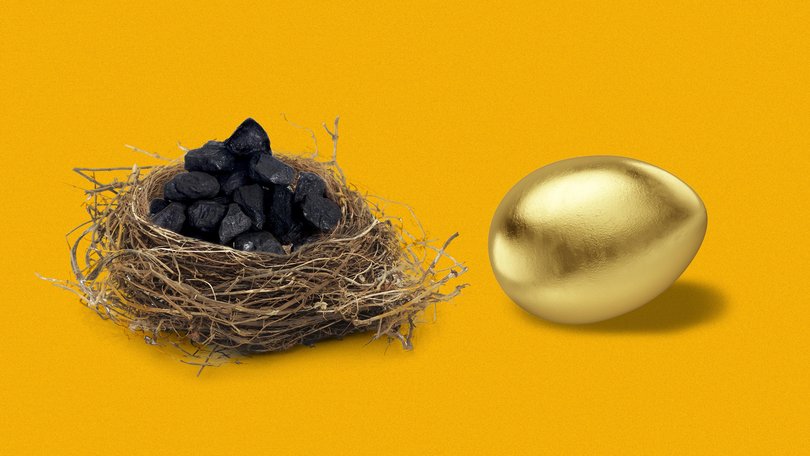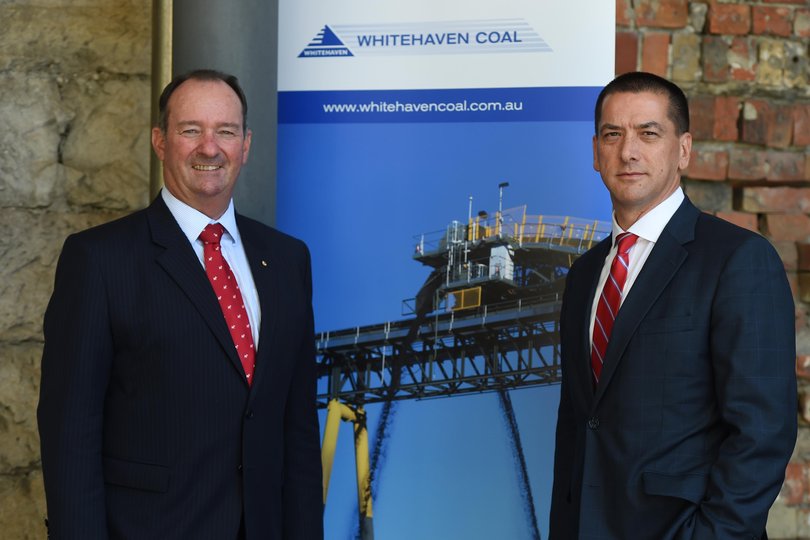Australia’s biggest superannuation fund discovers a love of coal
AARON PATRICK: After years campaigning for companies to cut Greenhouse gas emissions, AustralianSuper is building a stake in Australia’s leading coal miner.

For more than a decade, the country’s biggest superannuation fund, AustralianSuper, has been preaching to the business community about how to be better.
Not how to make more money for investors. But to be superior, ethically. Atop of the fund’s moral hierarchy sits climate change, a problem its employees raised with 48 per cent of the big Australian companies they spoke to last financial year.
Funded by 3.5 million investors, AustralianSuper spends about half a billion dollars a year running itself. The costs include a large Environmental, Social and Governance department, which vets investments based on complex criteria to ensure they don’t damage the environment.
Sign up to The Nightly's newsletters.
Get the first look at the digital newspaper, curated daily stories and breaking headlines delivered to your inbox.
By continuing you agree to our Terms and Privacy Policy.Which is why it is reasonable to ask if AustralianSuper is hypocritical for investing in Whitehaven Coal, which describes itself as Australia’s leading coal producer.
The answer is: probably yes, but the fund is demonstrating a welcome dose of pragmatism.
Vote of confidence
On Tuesday AustralianSuper reported that it owns 7 per cent of the company, up from 5 per cent in May.
The fund does not explain the rationale behind specific investments, but it is not a day-trading outfit. Its asset managers take long-term views about industries, based on information from around the world.
Which makes the Whitehaven investment look like a vote of confidence in Australia’s coal industry.
Asked this week about the apparent contradiction between backing coal and its goal of net zero greenhouse gas emissions by 2050, the fund said: “AustralianSuper considers ESG as part of our investment process. Our Equities and ESG teams meet together with companies to ensure a consistent view and focus on investment issues.”
Given AustralianSuper’s assertive ESG policies, it sounds like the ESG department either lost a debate with the investment team or didn’t contest the Whitehaven investment.
Industry shift
Either is good news for Australia’s coal and gas industries, which generate big profits and tax revenue for Australia. If AustralianSuper is shifting away from ESG policies, other big industry superannuation funds are likely to follow.
They won’t want to miss out on potential profits, and the consequence of a group change is likely to be less professional and social opprobrium for associating with coal miners. Whitehaven’s chairman Mark Vaile is a former Nationals MP, an example of how coal companies are often forced draw directors from outside the pool of inner-city professionals who populate most boards.

More institutional investment could make it cheaper for energy companies to raise money for new mines and extra wells. The increased supply would be good for Australians by lowering energy costs and raising corporate profits.
There is another perspective, of course. Coal critics argue the long-term damage to the climate would vastly outweigh any short-benefit from cheaper power.
“There is no economy on a dead planet,” said Tim Buckley, a former investment banker who lobbies the finance industry through the Institute for Energy Economics and Financial Analysis to cut off capital to oil, gas and coal companies.
“Clearly they (AustralianSuper) don’t have a powerful ESG department because they are ignoring climate risk.”
BHP dumped coal
Environmental advocates have become experts at embarrassing financial facilitators of traditional energy companies. From repeated climate-related motions at annual meetings to street protests outside bank branches, they harassed most of the big banks into cutting back lending to oil, gas and coal producers over the past few years.
Even BHP, which built Australia’s steel industry at Newcastle to be close to Hunter Valley coal, decided in 2020 to sell mines that produce coal for power plants, known as thermal or steaming coal.
Those transactions now look like the deals of the decade — for the buyers. Coal prices surged after Russia’s invasion of Ukraine in 2022 and remain elevated.
The buyers of BHP’s assets included Whitehaven. The Sydney-based company, which has about 4000 employees, generated almost $1 billion cash in the first six months of this financial year, and posted an operating profit of 33 per cent.
Public records indicate AustralianSuper owns 3.6 per cent of BHP, a holding that’s unsurprising given BHP is one of Australia’s most valuable companies. AustralianSuper’s recent purchases of Whitehaven shares means shareholders’ money has followed the coal mines from the seller to the buyer.
Financing anti-coal groups
AustralianSuper’s decision to put profits ahead of activism is good news for its investors. As for harm to the climate from using the coal to make steel or electricity in Japan, China, South Korea and India, that is the responsibility of those countries under the 2015 Paris Climate Agreement, which was regarded as the turning point in global cooperation to slow warming.
A couple of years ago AustralianSuper promoted its chairmanship of Climate Action 100+, a group it help set up to pressure traditional energy companies to support net zero policies. It helps fund the Australian Industry Energy Transitions Initiative, which promotes wind and solar power.
No doubt the intentions are pure, but the contradiction of financing anti-coal organisations and investing in coal mines is so great that investors deserves a clear explanation from AustralianSuper.
Many investors signed up without understanding they could chose another fund. They should be told if profits will now come before environmental and social activism.

